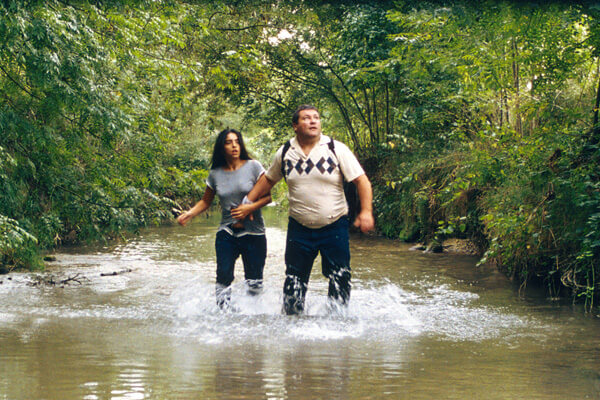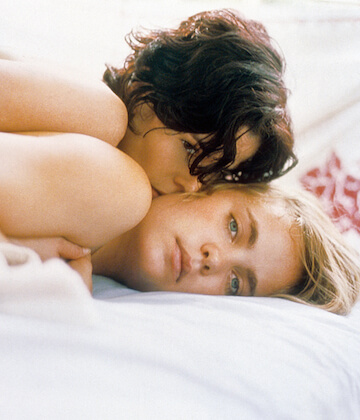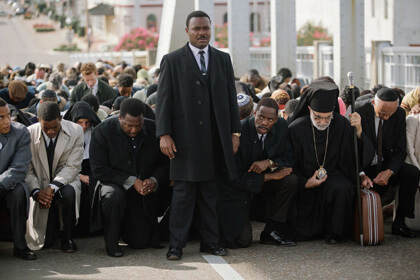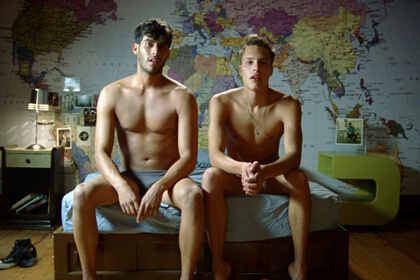Hafsia Herzi and Ludovic Berthillot in Alain Guiraudie’s “The King of Escape.” | INSTITUT FRANÇAIS
Sometimes filmmakers suddenly burst into the spotlight after years of neglect. In America, 2014 is turning out to be Alain Guiraudie’s year. His latest film, “Stranger by the Lake,” has been a modest commercial success and a major critical hit. I expect it to rank in the Top 10 in the Village Voice and indieWIRE year-end critics’ polls. The release of “Stranger by the Lake” was accompanied by the Film Society of Lincoln Center’s retrospective of Guiraudie’s entire oeuvre of work, none of which has been distributed in the US until now. In the wake of “Stranger by the Lake,” Anthology Film Archives is giving his 2009 film “The King of Escape” a weeklong run.
Ironically, “Stranger by the Lake” is the weakest of the four Guiraudie films I’ve seen, and “The King of Escape” the best. I suspect the fact that “Stranger by the Lake” is a thriller that contains unsimulated gay sex accounts for much of its success. But the odd thing about its near-universal acclaim is that it’s not too far from queer controversy magnets like “Cruising” and “Basic Instinct” in its equation of gay sex and death.
Indeed, critic David Ehrenstein has suggested that it’s essentially “Cruising” as made by a gay man. “Stranger by the Lake” tackles sexual taboos from a conservative perspective, reviving dated stereotypes about oversexed and amoral gay men at a point when the “new normal” among young gay men exerts pressure to settle down in monogamous couples and get married (where possible), not engage in public cruising.
Passion between a middle-aged gay schlub and a teenage girl has them on the run
“The King of Escape” also addresses taboo subjects — conventional beauty standards among gay men, sexual fluidity, and intergenerational relationships — but without the hand of doom hanging over its characters to the same degree.
Armand (Ludovic Berthillot) is a 43-year-old, overweight gay tractor salesman. One night, he rescues a teenage girl, Curly (Hafsia Herzi), from a gang rape by paying off the attackers. She becomes attracted to him. Undergoing a midlife crisis and wanting to experiment with heterosexuality, Armand embarks on a relationship with Curly. This leads to his arrest because of her age. Although nothing much has happened — at this point, the couple have done nothing more than kiss — he’s forced to wear a sex offender’s wrist bracelet. The couple decide to go on the run through the local forest.
I’m not sure if Guiraudie works with non-professional actors, but, with the exception of Herzi, who appeared in Abdellatif Kechiche’s “The Secret of the Grain,” I don’t see familiar faces in his films. He’s a genuine regionalist, shooting far away from Paris and other French cities. Without emphasizing it, “The King of Escape” offers great vistas of the beautiful French countryside. Yet its characters don’t have time to stop and enjoy them, as Armand and Curly are being chased through it. Like “Stranger by the Lake,” “The King of Escape” depicts public cruising, but this film’s take on it is far more affirmative.
Showing overweight men with beautiful women isn’t exactly breaking a taboo, as anyone who’s seen a Judd Apatow film can testify. But Apatow never depicted a completely nude Seth Rogen, with his belly exposed, having explicit sex with Katherine Heigl. Guiraudie doesn’t cater to the vanity of his characters — or his actors. James Gandolfini was a minor sex symbol in some corners of the gay community, but Berthillot doesn’t have the late actor’s charisma. He’s completely convincing as an everyday schlub — there’s nothing larger than life about his performance. Gay men can be just as inflexible about weight and looks as our heterosexual counterparts; “The King of Escape” dares to show men over 40, who obviously don’t spend much time at the gym, in sexual situations.
Some of Guiraudie’s films, like his 2005 “Time Has Come,” show a pronounced sense of whimsy, evident in wordplay. The closest “The King of Escape” comes to such a sensibility is its invention of a drug called “doo-root.” It’s an aphrodisiac that seems to combine the effects of Viagra and amphetamines, although it looks like a small potato.
“The King of Escape” does show a deadpan sense of humor throughout, even if it’s rarely laugh-out-loud funny. At times, it aims for maximum incongruity, as when the police round up cruisers and try to convince them to join the search for Armand and Curly. In “Stranger by the Lake,” Guiraudie has a straight cop deliver something approximating the film’s message, but in “The King of Escape,” the police are comic menaces.
Guiraudie’s a major filmmaker, and it’s a shame that it’s taken the US so long to catch on to his work. For all my problems with “Stranger by the Lake,” it’s opened doors for him that have allowed us to see more of his earlier, stronger films. I hope those doors don’t close again if Guiraudie’s next film is closer to the warm humor of “The King of Escape” than the dark moralism and hardcore sex of “Stranger by the Lake.”
THE KING OF ESCAPE | Directed by Alain Guiraudie | Institut Français | In French with English subtitles | Opens Apr. 11 | Anthology Film Archives, 32 Second Ave. at Second St. | anthologyfilmarchives.org




































